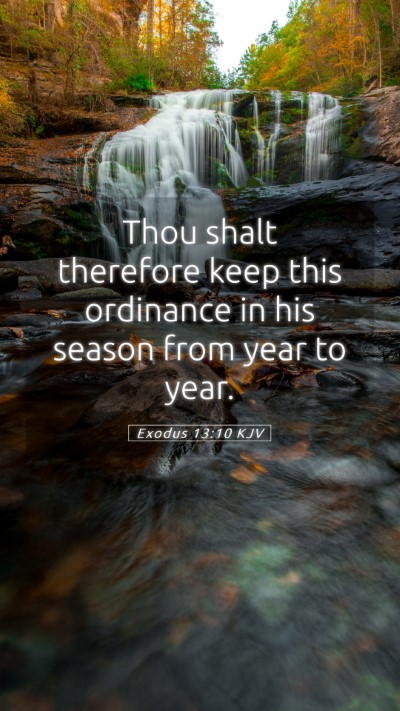Understanding Exodus 13:10
Bible Verse: Exodus 13:10
"You shall therefore keep this ordinance in its season from year to year."
Summary and Interpretation
The verse Exodus 13:10 speaks to the commandment given to the Israelites regarding the observance of specific religious rituals, particularly the consecration of the firstborn. This instruction is rooted deeply in the context of their deliverance from Egypt and serves as an essential reminder of God's faithfulness and power.
Key Themes in Exodus 13:10
- Faithfulness to God's Commands: The Israelites are instructed to adhere to this ordinance as an act of obedience. This reflects a broader biblical theme emphasizing the importance of following divine instructions, similar to the admonishments found in Deuteronomy 6:1-3.
- The Importance of Remembrance: Regular observance is a means to remember God's past acts of deliverance, serving to strengthen faith and build community identity, parallel to the Passover observance.
- Generational Teaching: This command also underscores the importance of passing down religious practices to future generations, ensuring that the story of deliverance is never forgotten, which can be seen in Psalm 78:4-6.
- Seasonal Worship: The mention of "season" highlights the significance of timing in worship, reinforcing patterns of religious observance that align with agricultural cycles, reflecting the holistic nature of biblical worship.
Commentary Insights
Matthew Henry's Commentary
Matthew Henry emphasizes the necessity of keeping God's ordinances as a sign of fidelity and gratitude towards God for His salvation. He asserts that such practices help maintain a relationship with God and foster a spirit of obedience among the people.
Albert Barnes' Notes on the Bible
Albert Barnes highlights the notion that this ordinance establishes a recurring reminder of God's hand in the past events surrounding their freedom from slavery. He posits that annual celebrations not only serve a religious purpose but also cultivate community spirit, binding them together in their shared history and faith.
Adam Clarke's Commentary
Adam Clarke interprets this command as integral to the covenant relationship between God and Israel. He believes it speaks to a culture of remembrance and acts of worship that help solidify identity and devotion, ensuring that God’s mighty acts are recognized and celebrated every year.
Application and Relevance Today
In modern practice, this verse can prompt reflection on how contemporary believers observe and commemorate their own spiritual milestones. Keeping traditions and annual observances can help in cultivating a deeper understanding of faith and a richer connection to community.
Bible Study Insights
- This verse invites discussion in bible study groups regarding how traditions shape faith.
- Consider incorporating bible study tools to analyze rituals and their significance in personal and communal faith practices.
- Encourage bible study guides to help unpack the historical context and meaning of similar ordinances across Scripture.
Related Bible Cross References
- Exodus 12:29-30: Discusses the Passover and the death of the firstborn as a foundational event for Israel's identity.
- Deuteronomy 6:20-25: Highlights the importance of teaching future generations about God's commandments and their significance.
- Luke 2:22: Relates to the consecration of the firstborn in the New Testament context, showing continuity of the Old Testament law.
Conclusion
Exodus 13:10 forms an essential anchor in understanding the concept of worship and obedience in the life of the believer. The reminder to keep God’s ordinances alive in practice not only honors the past but also informs the present faith journey.


